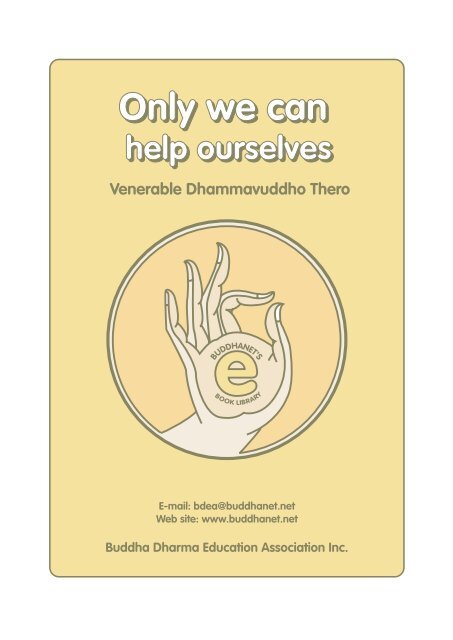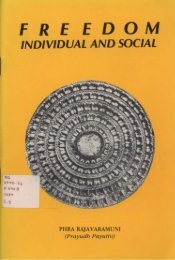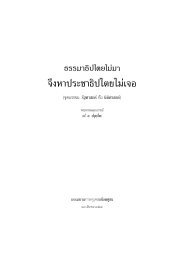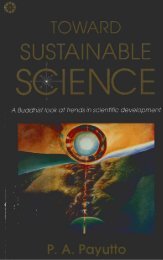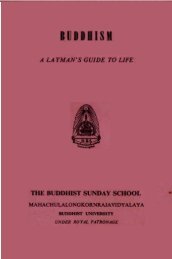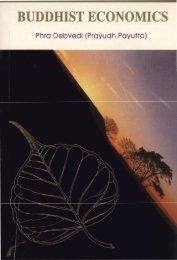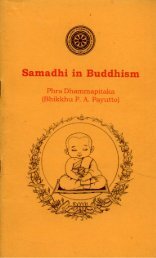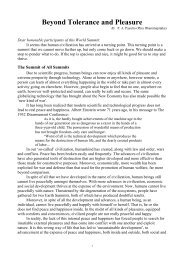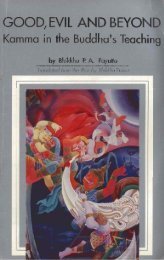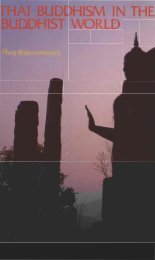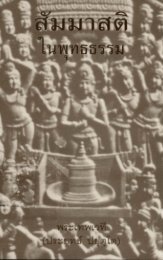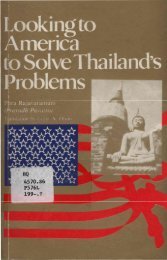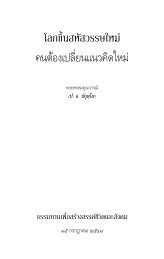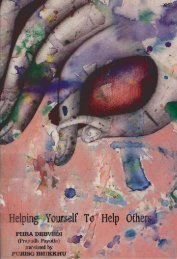Only we can help ourselves
Create successful ePaper yourself
Turn your PDF publications into a flip-book with our unique Google optimized e-Paper software.
<strong>Only</strong> <strong>we</strong> <strong>can</strong><br />
<strong>help</strong> <strong>ourselves</strong><br />
Venerable Dhammavuddho Thero<br />
e<br />
BUDDHANET'S<br />
BOOK LIBRARY<br />
E-mail: bdea@buddhanet.net<br />
Web site: www.buddhanet.net<br />
Buddha Dharma Education Association Inc.
AN INWARD JOURNEY BOOK<br />
IJ040 / 00<br />
ONLY WE<br />
CAN HELP<br />
OURSELVES<br />
Dhammavuddho Thero<br />
Published by<br />
INWARD PATH<br />
Penang • Malaysia
Sabba dānaṃ dhammadānaṃ jināti<br />
The gift of Dhamma surpasses all gifts<br />
ONLY WE CAN HELP OURSELVES (BASED ON A TALK)<br />
This essay is based on a talk “The Working of Kamma” by the<br />
author at the Kuching Buddhist Society, Sarawak in December,<br />
1997 and was published by the Buddhist Gem Fellowship in<br />
their book “K. Sri Dhammananda Felicitation” in 1999. It is reproduced<br />
here with some minor amendments.<br />
An Inward Journey Book<br />
Published by Inward Path<br />
PO. Box 1034, 10830 Penang, Malaysia<br />
Tel / Fax: 604 659 6696 • 604 890 6696<br />
Email: Sunanda@pc.jaring.my • InwardPath@hotmail.com<br />
Website: http://www.buddhanet.net/ipp.htm<br />
For free distribution and not for sale<br />
Copyright © 2000 Dhammavuddho Thero<br />
Perpustakaan Negara Malaysia Cataloguing-in-Publication Data<br />
Dhammavuddho Thero, 1947<br />
<strong>Only</strong> <strong>we</strong> <strong>can</strong> <strong>help</strong> <strong>ourselves</strong> / Dhammavuddho Thero<br />
ISBN 983-9439-38-3<br />
1. Buddhism. 2. Buddhism—Doctrines. I. Title.<br />
294.3444<br />
May the merits accruing from this Dhamma-dāna be shared by all beings.<br />
May all beings be <strong>we</strong>ll and happy, live in peace and harmony, be enlightened<br />
soon and liberated from all suffering.<br />
Book Layout and Design by Sunanda Lim Hock Eng<br />
iv
INTRODUCTION<br />
Kamma is usually an interesting subject because it concerns<br />
everyone and there are many different aspects of it. There are<br />
many natural laws that govern our lives but the most important<br />
is the law of kamma-vipāka.<br />
In a discourse (A.N. 6.63) the Buddha said, “Intention,<br />
monks, is kamma I say. Having willed, one acts through body,<br />
speech and mind”. This means that intentional action is kamma,<br />
and vipāka is the result or effects of it. The result may ripen immediately,<br />
later in this life or in a future life.<br />
The Buddhist perspective of kamma is not one of fatalistic<br />
surrender, for the scriptures aptly document numerous instances<br />
whereby <strong>we</strong> <strong>can</strong> counteract or <strong>we</strong>aken the effects of<br />
our previous evil kamma by building up on our own treasure<br />
store of good kamma here and now.<br />
We definitely <strong>can</strong>not alter what has been sown in our past,<br />
but by skillfully exercising wisdom, loving kindness and compassion<br />
in our present actions, <strong>we</strong> <strong>can</strong> surely determine a future<br />
in line with our hopes and aspirations. We <strong>can</strong> <strong>help</strong> <strong>ourselves</strong><br />
by sincerely embarking on this journey of transformation<br />
and with the greatest love for <strong>ourselves</strong>. For who else <strong>can</strong><br />
<strong>help</strong> us but <strong>ourselves</strong>.<br />
Venerable Dhammavuddho Thero was born in 1947 and<br />
worked as an electrical engineer with the Public Works<br />
Department for t<strong>we</strong>lve years. He <strong>we</strong>nt forth into the homeless<br />
life as a monk at the age of 35. He was first ordained in the<br />
Chinese Mahayana tradition. In 1986 he was re-ordained in<br />
the Therāvada tradition in Thailand. After that he spent about<br />
ten years living the solitary lifestyle in quiet places. He has<br />
also written numerous booklets and articles on Buddhism.<br />
Venerable Dhammavuddho is presently abbot of a newly<br />
established 15-acre forest monastery in Temoh, a small town<br />
near Ipoh, Perak.<br />
v
CONTENTS<br />
ONLY WE CAN HELP OURSELVES (BASED ON A TALK) .......... IV<br />
INTRODUCTION ...................................................................................................... V<br />
WHAT IS KAMMA? ............................................................................................. 7<br />
AVOIDING EVIL ....................................................................................................... 9<br />
DOING GOOD ....................................................................................................... 12<br />
EFFECTS OF KAMMA ....................................................................................... 16<br />
CRITERIA FOR ACTION ................................................................................. 20<br />
WORKING OF KAMMA .................................................................................. 22<br />
ONLY WE CAN HELP OURSELVES ................................................... 25<br />
KAMMA AND CONDITIONS ...................................................................... 29<br />
OVERCOMING EVIL KAMMA .................................................................. 31<br />
KAMMA AND REBIRTH ................................................................................. 34<br />
WORLDLY MERIT AND SPIRITUAL MERIT ................................... 38<br />
CONCLUSION ......................................................................................................... 39<br />
vi
ONLY WE CAN HELP OURSELVES<br />
Namo Tassa Bhagavato Arahato Samma Sambuddhassa<br />
WHAT IS KAMMA?<br />
Kamma is usually an interesting subject because it concerns<br />
everyone and there are many different aspects of<br />
it. There are many natural laws that govern our lives but<br />
the most important is the law of kamma-vipāka. In a discourse<br />
(A.N. 6.63) the Buddha said “Intention, monks,<br />
is Kamma I say. Having willed, one acts through body,<br />
speech and mind”. This means that intentional action is<br />
kamma, and vipāka is the result or effects of it. The result<br />
may ripen immediately, later in this life or in a future<br />
life.<br />
Kamma-vipāka is sometimes translated as cause and<br />
effect (yin-kuo in Chinese books) but that is not a good<br />
translation. This is because there are two types of cause<br />
and effect-worldly cause and effect, and kammic cause and<br />
effect. The difference <strong>can</strong> be seen, for example, when you<br />
are driving a car and suddenly a small boy runs across<br />
the road, and you hit the boy and kill him. You did not<br />
have the intention to kill the small boy, so you did not<br />
create any kamma. Ho<strong>we</strong>ver, you did knock down the<br />
boy and the boy’s family might pull you out of the car<br />
7
when you stop, and beat you up. In addition to that, they<br />
might also sue you in court. So there is a result of knocking<br />
down the boy, namely, you get a beating and then be<br />
sued in court. Ho<strong>we</strong>ver, this is worldly cause and effect.<br />
It is not concerned with Buddhist kamma-vipāka because<br />
there was no intention on your part to kill the boy. So <strong>we</strong><br />
must clearly differentiate bet<strong>we</strong>en worldly cause and effect<br />
and kamma-vipāka (intentional action and its result).<br />
They are different because one involves action with intention<br />
and the other does not.<br />
Then comes the question: how do <strong>we</strong> create kamma?<br />
It is created through the three doors of body, speech and<br />
mind. Through the body, <strong>we</strong> <strong>can</strong> kill, steal, and commit<br />
adultery. Through speech, <strong>we</strong> lie, cause disharmony by<br />
carrying tales from one person to another, use coarse<br />
speech and idle talk (gossip). Mental kamma is when<br />
<strong>we</strong> have excessive greed and covetousness, malice and<br />
hatred, wrong views, etc. Mental kamma is not so much<br />
thinking or stray thoughts but thoughts with some kind<br />
of intention behind them.<br />
What is wholesome kamma and what is unwholesome<br />
kamma? In other words, what is good kamma and evil<br />
kamma? Good kamma is that which benefits living beings,<br />
<strong>help</strong>s living beings, and makes them happy. Evil kamma<br />
or unwholesome kamma is that which harms living beings,<br />
like killing and stealing, that results in the suffering<br />
of some living beings. In this way the criteria for good<br />
and evil in Buddhism is different from other religions.<br />
8
The effect of Kamma is also long lasting. For example,<br />
in one discourse (A.N. 5.31) a king’s daughter by the<br />
name of Sumana came to the Buddha and asked if there<br />
is a difference bet<strong>we</strong>en a person who likes to give alms<br />
to the monks and a person who does not, if both subsequently<br />
are reborn in heaven. The Buddha said that<br />
the difference bet<strong>we</strong>en the two of them is that the almsgiver<br />
surpasses the non-giver in life span, beauty, happiness,<br />
honour and po<strong>we</strong>r. Sumana then asked if there<br />
would be a difference bet<strong>we</strong>en the two subsequently<br />
when both are reborn into the human realm. Again the<br />
Buddha said there would be-the alms giver surpasses<br />
the non-giver in life span, beauty, happiness, honour<br />
and po<strong>we</strong>r. Sumana then asked whether there would<br />
be a difference bet<strong>we</strong>en the two when both renounced<br />
and became monks. The Buddha ans<strong>we</strong>red affirmatively.<br />
The alms giver will get more offerings of food,<br />
robes, medicines from the lay people when he is a monk;<br />
more people will like him and he will have more places<br />
to live compared to the non-giver. So <strong>we</strong> <strong>can</strong> see the longlasting<br />
effect of kamma which follows us.<br />
AVOIDING EVIL<br />
The Buddhas teaching is concerned with skilful living so<br />
that <strong>we</strong> <strong>can</strong> reduce or avoid unnecessary suffering. It is<br />
important to know the law of kamma-vipāka in order to<br />
9
avoid unnecessary suffering. In life, there are some types<br />
of suffering that are unavoidable but there are those that<br />
are avoidable. What is unavoidable suffering? It is growing<br />
old, becoming sick and dying. These are the three<br />
things that nobody <strong>can</strong> avoid. Ho<strong>we</strong>ver, there are certain<br />
sufferings that <strong>we</strong> <strong>can</strong> avoid. In the worldly sense,<br />
take for example, drinking and driving. If you drink and<br />
then drive at the same time, you’ll probably end up with<br />
an accident. Ho<strong>we</strong>ver, you know that when you drink,<br />
you shouldn’t drive and when you drive, you shouldn’t<br />
drink-that way you avoid an unnecessary accident. So in<br />
the same way, when it comes to kamma-vipāka, <strong>we</strong> know<br />
unskilful or evil actions which harm living beings bring<br />
suffering to the doer as a consequence. So <strong>we</strong> abstain<br />
from evil actions and avoid unnecessary suffering.<br />
The law of kamma-vipāka is like the saying “As you<br />
sow so shall you reap.” Depending on what you plant,<br />
you’ll get its fruit in return. So, <strong>we</strong> train <strong>ourselves</strong> to abstain<br />
from unwholesome or unskillful kamma. For this,<br />
the Buddha advised that <strong>we</strong> uphold the five precepts<br />
every day which is the basic training in moral conduct.<br />
The first precept is not to kill. The second is not to take<br />
what is not given. The third is not to commit adultery.<br />
The fourth is not to lie. The fifth is not to take intoxi<strong>can</strong>ts.<br />
These are the very basic things that are even found in<br />
the laws of the country. If you kill a human being, the<br />
law will get you; similarly, when you steal or run away<br />
with somebody’s wife or husband, or cheat, you will get<br />
10
yourself into a lot of trouble. So these five precepts are<br />
the basic things that <strong>we</strong> have to uphold. Note that these<br />
precepts are training rules, not commandments.<br />
In the early Buddhist teachings, it was not taught<br />
that <strong>we</strong> must become vegetarians. If you want to become<br />
a vegetarian, that is very good. Ho<strong>we</strong>ver, if you<br />
do not want to become a vegetarian, you should know<br />
when meat <strong>can</strong>not be eaten. The type of meat allo<strong>we</strong>d to<br />
be eaten has three conditions: when you do not (1) see,<br />
(2) hear, and (3) suspect, that the animal was specifically<br />
killed for you. With these three conditions, you do not<br />
experience the direct kamma of killing the animal because<br />
there was no intention on your part to do so although<br />
there may be worldly cause and effect involved.<br />
For instance, if you buy the meat from the market which<br />
is already slaughtered, e.g. fish that is already dead, that<br />
is acceptable. The type of meat that is not allo<strong>we</strong>d is<br />
where for example, you go to the market, and select a<br />
chicken and ask the seller to slaughter the chicken for<br />
you, or you enter a restaurant and select a live fish to be<br />
cooked.<br />
Eating meat does not necessarily mean that one approves<br />
of the killing of animals. Suffering (dukkha) is a<br />
fact of life, and as living beings strive to survive, those<br />
that succeed inevitably do so at the expense of other living<br />
beings. Eating vegetarian food still indirectly involves<br />
the killing of kangaroos and rabbits, squirrels and<br />
monkeys, insects and snails, and other ‘pests’ — should<br />
11
the whole world become vegetarians, animals would<br />
probably still be killed as they would multiply in such<br />
great numbers and so quickly as to be a threat to human<br />
survival (e.g. in Malaysia, dogs on the streets without<br />
licence are disposed of).<br />
DOING GOOD<br />
After avoiding evil, <strong>we</strong> need to do good and create<br />
wholesome kamma that benefits others, so that in return,<br />
<strong>we</strong> get the benefits too. Thus, the Buddha advised<br />
us to do dāna. Dāna is offerings or charity. You <strong>can</strong> also<br />
keep the eight precepts once a <strong>we</strong>ek. As lay people do<br />
not have much time to cultivate the spiritual path like<br />
monks, they <strong>can</strong> set aside one day each <strong>we</strong>ek to cultivate<br />
the eight precepts. This <strong>can</strong> be done either in a monastery,<br />
Buddhist Society or at home.<br />
The Buddha also explained how good kamma <strong>can</strong> result<br />
in a lot of blessings. In the Mangala Sutta, a heavenly<br />
being (deva) asked the Buddha about the highest blessings.<br />
The Buddha then taught the deva the ways to obtain<br />
the highest blessings. For instance, the Buddha said<br />
not to associate with fools but to associate with the wise;<br />
to respect those who are worthy of respect such as parents,<br />
elders, teachers and monks. To have much knowledge<br />
of the Buddhas teachings also brings you blessings.<br />
Discussion of the Dhamma with others, and hav-<br />
12
ing gratitude (which is not common in this world) brings<br />
blessings too. Among the first people that <strong>we</strong> need to<br />
show gratitude to are our parents because they have<br />
done a lot for us. It is a Buddhist tradition that <strong>we</strong> support<br />
and respect our parents. Another cause for blessings<br />
is humility. People sometimes forget about it when<br />
they succeed in life. When <strong>we</strong> become bosses, our ego<br />
increases and that is not good for us.<br />
Sometimes <strong>we</strong> forget these things, but when <strong>we</strong> read<br />
about the Dhamma, it reminds us to walk the good way.<br />
Meekness is another good quality. Even in the Bible, it<br />
is said, “Blessed are the meek for they shall inherit the<br />
kingdom of heaven.” Forbearance or patience is another<br />
important quality. People are sometimes not nice to us.<br />
In such cases, <strong>we</strong> have to be patient and try to see that<br />
perhaps <strong>we</strong> have done something wrong in the past and<br />
<strong>we</strong> are getting the retribution. When <strong>we</strong> see it in this way,<br />
<strong>we</strong> will learn to bear difficult or trying circumstances.<br />
Visiting monks or seeing monks so that <strong>we</strong> <strong>can</strong> learn<br />
some Dhamma is another way <strong>we</strong> <strong>can</strong> get blessings.<br />
In a discourse (A.N. 4.4.), the Buddha said that there<br />
are four types of persons to whom you must conduct<br />
yourself carefully because they are the four fields of<br />
merit and the four fields of demerit. If you are good towards<br />
them, there will be a lot of merit. If you act badly<br />
towards them, you will get a lot of demerit.<br />
The first type of person is the Buddha. Ho<strong>we</strong>ver,<br />
since the Buddha has passed into parinibbāna, <strong>we</strong> <strong>can</strong>-<br />
13
not interact with him. So, <strong>we</strong> <strong>can</strong>not do anything about<br />
that. The second type of person is the disciples of the<br />
Buddha, namely the monks and nuns. We have to be<br />
careful not to create bad kamma with monks and nuns<br />
because if that monk or nun is a good monk or nun, then<br />
our demerit is serious. The third one is our mother, and<br />
the fourth is our father.<br />
Our mothers and fathers are a good field of merit. If<br />
you serve your mother and father <strong>we</strong>ll, you will get a lot<br />
of blessings. Some people make the mistake of being not<br />
filial towards their parents, and after their parents have<br />
passed away, they may get a lot of remorse that trouble<br />
their minds. Therefore, <strong>we</strong> learn from the Buddhas<br />
teachings to be good to our parents while they are still<br />
alive. After they have passed away, there is not much<br />
<strong>we</strong> <strong>can</strong> do for them. To really repay our parents’ kindness,<br />
<strong>we</strong> should teach them to have faith in the Buddha,<br />
Dhamma and Sangha, to uphold the five precepts, to be<br />
generous or charitable, and to listen to the Buddha’s discourses<br />
so as to have more wisdom.<br />
The first advantage of doing wholesome kamma is that<br />
you will get a good reputation. Because if you do not kill,<br />
do not steal, commit adultery or lie, you will get a good<br />
reputation. You will have nothing to be ashamed of when<br />
you do good kamma instead of evil kamma, and that is the<br />
second advantage of doing good. When you are facing a<br />
group of people, you would dare to face them without<br />
any sense of shame. Whereas, if you have done shame-<br />
14
ful deeds, you would not have such confidence.<br />
Another advantage of doing good kamma is that <strong>we</strong><br />
would have a very clear mind when <strong>we</strong> grow old because<br />
there is no remorse to disturb us. When I lived in<br />
Penang a few years ago, I had a very devoted old supporter<br />
to whose house I used to go on alms round. This<br />
old woman is in her 80s and she is very thin and frail,<br />
but her mind is very clear. She has a very good memory<br />
as a result of keeping the precepts very thoroughly and<br />
practising much charity. She <strong>can</strong> even remember telephone<br />
numbers quite clearly.<br />
On the other hand, there are some people who do<br />
not keep the precepts. When they reach their 50s, their<br />
mind is often disturbed and troubled, and very quickly<br />
by the age of 55, they are already senile and talking nonsense.<br />
This is because they have a lot of unwholesome<br />
kamma troubling their minds.<br />
We are also not afraid to die when <strong>we</strong> keep the precepts<br />
and do good. If <strong>we</strong> have very good kamma, <strong>we</strong> have<br />
the confidence that the good kamma will support us when<br />
<strong>we</strong> die. We know that when <strong>we</strong> close our eyes and pass<br />
away, <strong>we</strong> will be going to a good place. Whereas, people<br />
who have done a lot of evil are afraid of dying when<br />
their time comes. They are very scared and dare not close<br />
their eyes. Some of them do not even dare to switch off<br />
the lights at night, and some are even terrified.<br />
Lastly, if you have good kamma, the Buddha said that<br />
it will lead us to a good rebirth. If in addition to doing<br />
15
good <strong>we</strong> encourage others to do good, or approve of<br />
good deeds or praise the doing of good, then more blessings<br />
are generated. And vice versa for doing evil — more<br />
demerit is created.<br />
According to a discourse (A.N. 8.36), there are three<br />
bases of meritorious action — charity (dāna), moral conduct<br />
(sīla) and mind development (bhāvanā). A person<br />
who practises charity and moral conduct only on a small<br />
scale would be reborn as a human being of poor luck.<br />
One who practises these two things to a medium degree<br />
would be reborn as a human being of good fortune. And<br />
one who practises charity and moral conduct to a high<br />
degree would be reborn in the heavenly realm. This<br />
also implies that people who practise neither charity<br />
nor moral conduct would be reborn in the three woeful<br />
states-ghost, animal and hell realms — and that would<br />
be the majority of people.<br />
EFFECTS OF KAMMA<br />
There is a discourse called Culakammavibhanga Sutta<br />
where a person asked the Buddha why people in the<br />
world are different: some are ugly, some are beautiful;<br />
some have short life, others have long life; etc. The<br />
Buddha said that beings are born of their kamma, owners<br />
of their kamma, abide supported by their kamma.<br />
The Buddha explained that if in a previous life, a per-<br />
16
son is always angry, then when he is reborn as a human,<br />
he would become ugly. If a person is good-natured, and<br />
does not have a temper, he would be born beautiful. This<br />
is because every time <strong>we</strong> become angry, our face looks<br />
fierce and ugly. When <strong>we</strong> are often angry, <strong>we</strong> habitually<br />
make our face fierce and ugly. So <strong>we</strong> are reborn with a<br />
fierce and ugly face, and people will say it is an ugly face.<br />
Whereas another person who is good-natured, always<br />
smiling and takes things evenly will have a face that is<br />
s<strong>we</strong>et and pleasant. Naturally, he will be born beautiful.<br />
Why is a person born sickly? The Buddha said that<br />
if a person likes to harm living beings, for example, beat<br />
his slaves, or dogs or other animals and make their bodies<br />
painful, then the next time when he comes back as a<br />
human, he will have a sickly body that gives him pain<br />
as a retribution. Ho<strong>we</strong>ver, if you do not torture other<br />
beings and do not make their bodies painful, then naturally,<br />
when you come back as a human, you will be<br />
healthy and strong.<br />
If a person — in a past life has done a lot of killing, for<br />
example, he liked to go hunting, and fishing — in other<br />
words, he enjoys himself at the expense of the life of<br />
other beings-due to the fact that he had made other beings’<br />
lives short, the next time he will get a short life as<br />
a result. You see some children that are born but do not<br />
survive, or pass away very young. Some children suffer<br />
from <strong>can</strong>cer although they are very young. On the other<br />
hand, a person who does not kill, and who allows other<br />
17
eings to have a long life, will naturally have long life<br />
as a result.<br />
If you have been selfish in the past-never charitable,<br />
never <strong>help</strong>ful to others — in the next life, you will be reborn<br />
into a poor family. When you try to do business,<br />
nobody wants to support you. Ho<strong>we</strong>ver, if you are charitable,<br />
very <strong>help</strong>ful towards others, in the next life, you<br />
will get it back. You might be born into a <strong>we</strong>althy family,<br />
or if you start a business, people will come and support<br />
you. So you become <strong>we</strong>althy very easily. You <strong>can</strong><br />
see this sometimes. There might be two shops selling<br />
the same things on the same road, but one might be successful<br />
and the other a failure. Therefore, some of the<br />
things that the Buddha taught are self-evident because<br />
you <strong>can</strong> see it all around us.<br />
Why is a person born stupid? This is because in the<br />
past, when you did not know something, you did not<br />
take the trouble to investigate what is wholesome and<br />
unwholesome. Another reason for stupidity could be<br />
due to the fact that the person drank too much liquor.<br />
Why is a person born intelligent? Firstly, if he does not<br />
know something, he takes the trouble to ask and investigate.<br />
The other reason is that he avoids intoxi<strong>can</strong>ts<br />
like liquor and drugs. The third reason is that he meditates.<br />
We meditate to develop our mind. It brings us<br />
wisdom.<br />
Why are some people unknown and insignifi<strong>can</strong>t,<br />
and others are influential and <strong>we</strong>ll-known? The Buddha<br />
18
said that the person who is unknown and insignifi<strong>can</strong>t<br />
is a person who was a small-hearted person, who was always<br />
jealous of other people, and very spiteful. Therefore,<br />
when he is reborn, he becomes unknown and insignifi<strong>can</strong>t.<br />
Nobody bothers about him. Whereas another person<br />
is big-hearted and was never jealous of other people.<br />
He had a lot of goodwill instead of ill-will. Therefore,<br />
that person, when he comes to be a human again, will be<br />
born influential and <strong>we</strong>ll-known, and po<strong>we</strong>rful.<br />
So kamma <strong>can</strong> explain why people in the world are all<br />
different. Due to past life kamma, each of us comes into<br />
life with different qualities. Ho<strong>we</strong>ver, <strong>we</strong> must remember<br />
that <strong>we</strong> <strong>can</strong>not put it all on past life kamma alone, because<br />
the law of kamma does not only concern our past<br />
life kamma but also our present life kamma. If you say<br />
that everything is due to past life kamma, then <strong>we</strong> do not<br />
need to do anything-just sit down and wait for kamma to<br />
bring us everything. Evidently, you <strong>can</strong> see that it does<br />
not work this way.<br />
We take an example of the Form 5 students studying<br />
to try to get ten As in their examinations. Let us consider<br />
three types of students. The first one does not bother to<br />
study, but he goes around praying from temple to “dato<br />
kong” (a deity) and everywhere else, trying to get ten As,<br />
but refuses to study. So, <strong>can</strong> he get ten As? Definitely not<br />
because he does not put in the effort, that is, he does not<br />
put in the kamma. He relies on past kamma only.<br />
The second student studies very hard, but unfortu-<br />
19
nately, he is born not very smart, but he works hard. He<br />
stays up late until 12 midnight, sleeps six hours, and studies<br />
hard everyday. Perhaps he might get two or three As,<br />
but he won’t get ten As because he is not very smart. The<br />
third student is born very intelligent, and on top of that,<br />
he studies very hard. He is the type of person who <strong>can</strong><br />
get ten As. For the second student who studies very hard,<br />
that is his present life kamma. Ho<strong>we</strong>ver, he did not have<br />
the support of past life kamma that gives him intelligence.<br />
That is why he did not succeed. On the other hand, the<br />
third student has the support from previous life kamma<br />
to be born very smart, and he works hard (present life<br />
kamma). When both the past life and the present life kammas<br />
are working together, <strong>we</strong> <strong>can</strong> get what <strong>we</strong> want. This<br />
is a fact that <strong>we</strong> have to keep in mind.<br />
It is because of this reason that the Buddha said that<br />
<strong>we</strong> have to strive. The Buddha said that all Buddhas only<br />
show the way. Striving should be done by you. Therefore,<br />
<strong>we</strong> should understand that the Dhamma only guides us;<br />
<strong>we</strong> have to do the walking <strong>ourselves</strong>. That is why some<br />
people say that Buddhism is a do-it-yourself religion.<br />
CRITERIA FOR ACTION<br />
In one discourse (M.N. 61), the Buddha advised about performing<br />
kamma. He said that before <strong>we</strong> do any kamma, <strong>we</strong><br />
have to reflect, “This kamma that I am going to do through<br />
20
ody, speech and mind-is it going to harm somebody? If<br />
it is going to harm some being or myself, I should not do<br />
it. Ho<strong>we</strong>ver, if it benefits some other being, or if it benefits<br />
myself, then I should do it, and do it again and again.”<br />
So before you do a kamma, you must reflect. Even<br />
while doing the kamma, the Buddha said that <strong>we</strong> must<br />
also reflect. In the midst of doing the kamma, <strong>we</strong> must<br />
reflect thus, “Is what I am doing now right or wrong?<br />
If it is right, I’ll continue to do it. If it is wrong, I’ll stop<br />
immediately.” After the action is done, <strong>we</strong> should again<br />
reflect back and think carefully what <strong>we</strong> did — yesterday,<br />
or three days ago, or a <strong>we</strong>ek ago, or a month ago.<br />
You reflect on whether the action was correct or not, and<br />
whether you should have done it or not. When <strong>we</strong> reflect<br />
on our actions in this way, <strong>we</strong> will be living our lives<br />
skillfully, and <strong>we</strong> will avoid unnecessary suffering.<br />
Another good criterion for judging whether a kamma is<br />
good and should be done, or whether it is an evil kamma<br />
that should not be done, is, according to the Buddha,<br />
whether the kamma leads to an increase, or decrease in<br />
wholesome states of mind; or a decrease or increase in<br />
unwholesome states of mind, in yourself and other people.<br />
If the kamma brings about an increase in wholesome<br />
states of mind, or a decrease in unwholesome states of<br />
mind in others or oneself, then that is good kamma which<br />
should be performed again and again.<br />
What are wholesome states? Wholesome states are<br />
good states of mind; happy states of mind, like non-<br />
21
attachment; goodwill instead of ill-will; a tranquil mind<br />
instead of a restless mind; not jealous of others; and the<br />
like. So this kind of wholesome states of mind gives you<br />
peace, gives you a happy state.<br />
Whereas unwholesome states of mind are states that<br />
make you agitated; make you unhappy, e.g. greed, anger,<br />
restlessness, jealousy, arrogance. Evil kamma or unwholesome<br />
kamma leads to a decrease in wholesome states or<br />
an increase in unwholesome states. You should avoid<br />
performing this kind of kamma.<br />
WORKING OF KAMMA<br />
In one discourse (S.N. 36.21), the Buddha said that not<br />
all suffering is due to kamma. Besides kamma, there are<br />
other factors that <strong>can</strong> cause us suffering. Suffering could<br />
be due to imbalance of wind or bile or phlegm. It could<br />
be the <strong>we</strong>ather, perhaps. In Kuching, for example, the air<br />
pollution index suddenly shot up to about 1,000 (in the<br />
year 1997) and caused a great deal of suffering. Another<br />
reason could be our own carelessness. Another possible<br />
reason is accident.<br />
Ho<strong>we</strong>ver, things mostly, happen because of kamma.<br />
Consider the case of a person who gets involved in an accident,<br />
and passes away. If his death is due to carelessness,<br />
or accidental occurences, then it means that his kamma as<br />
a human being might not be over. He would probably be<br />
22
eborn as a human being. Ho<strong>we</strong>ver, if his death is because<br />
his kamma as a human being has ended, then he would<br />
not be reborn as a human being. He would be reborn<br />
in another plane of existence. Therefore, this is another<br />
thing to remember; not everything is due to kamma.<br />
There are five kammic offenses mentioned in a discourse<br />
that are considered as most serious. The first<br />
serious offence is when you intentionally shed the blood<br />
of a Buddha with evil intent. The second serious offence<br />
is when you kill an Arahat. The third serious offence is<br />
the killing of your own mother. The fourth offence is<br />
the killing of your own father. Lastly, you cause disharmony<br />
among the harmonious community of monks that<br />
result in the community being split. These five offenses<br />
will bring one down to hell in the next rebirth, and will<br />
make one stay there for a long time.<br />
The working of kamma-vipāka is very complex. The<br />
Buddha said in one discourse (A.N. 4.77) that there are<br />
four things that you should not think about too much. If<br />
you think too much about these four things, you would<br />
become deranged. The first is the po<strong>we</strong>r of the Buddha;<br />
the second is the depth and po<strong>we</strong>r of jhāna; the third is<br />
kamma-vipāka; and the fourth is speculation about the<br />
nature of the world.<br />
Why should <strong>we</strong> not think too much about kammavipāka?<br />
It is because kamma-vipāka is very complex. The<br />
working of kamma-vipāka depends not only on your<br />
present lifetime but also on many, many lifetimes of un-<br />
23
settled kamma accounts. On top of that, the result of it<br />
depends on the state of mind at that moment. Moreover,<br />
the state of mind of the other person you do the kamma<br />
to also affects your vipāka. For example, when you make<br />
an offering to a murderer, or a criminal, or to an evil person,<br />
your merit is very small, but if you make an offering<br />
to a holy man, then your merit or blessings is great.<br />
Conversely, if you kill a holy man, then your kammic offence<br />
is very great. Whereas, if you kill a mosquito, the<br />
kamma is not as bad, but still you are not encouraged to<br />
kill it. The workings of kamma-vipāka is very complex<br />
that <strong>we</strong> find it hard to understand.<br />
Sometimes <strong>we</strong> see certain people whom you consider<br />
as evil, rough, stingy, and offensive, but they are<br />
having a luxurious life. This is sometimes due to their<br />
good kamma from past life supporting them, and they<br />
are now creating a lot of bad kamma which has not ripened<br />
yet. This could be due to the fact that people <strong>can</strong><br />
change. For example, when a man is poor he is humble,<br />
industrious, faithful to his wife, frugal, etc. When he becomes<br />
rich after several years, he may become arrogant,<br />
vain, womanize, drink, gamble, etc.-a completely different<br />
personality. Similarly, a good person in a previous<br />
life, when reborn under favourable conditions, might<br />
become corrupted by his good fortune. Because of this<br />
<strong>we</strong> find it hard to see fairness in this world. We see that<br />
good people are not the ones who are happy, but many<br />
evil people are happy. The working of kamma-vipāka is<br />
24
very difficult to see unless <strong>we</strong> have the psychic po<strong>we</strong>r to<br />
look into the past.<br />
ONLY WE CAN HELP OURSELVES<br />
There is one very important discourse (A.N. 5.43) where<br />
the Buddha said that there are certain things in the<br />
world that everybody wants but are very hard to obtain,<br />
namely, to be born beautiful, to have happiness, honour,<br />
a long life, and a good rebirth after death. The Buddha<br />
said that these things are not obtainable by prayers<br />
or vows, or even by thinking a lot about them everyday<br />
— for if they <strong>we</strong>re, why are beings suffering here? It<br />
is useless to only pray and make vows.<br />
The Buddha points out to us that if praying and making<br />
vows alone <strong>can</strong> bring us the things <strong>we</strong> want, then<br />
why is there suffering in the world? We mentioned earlier<br />
about the student trying to get ten As without studying,<br />
and who instead prays and makes vows, and goes<br />
from one deity to another deity. This student, of course<br />
would never get his ten As.<br />
So the Buddha said that <strong>we</strong> have to walk the path<br />
that brings us to what <strong>we</strong> want. This means that if you<br />
want long life, then you must not kill. If you do not kill,<br />
then you do not even have to pray because long life will<br />
come naturally. If you want to be born beautiful, be<br />
good natured, not angry. If you want happiness, give<br />
25
happiness and you will deserve happiness.<br />
Of course, it’s natural for most people to pray when<br />
they are suffering, and sometimes when <strong>we</strong> pray, our<br />
prayers are ans<strong>we</strong>red — mainly because <strong>we</strong> have the<br />
supporting kamma. For example, a person might be very,<br />
very rich, and he suddenly gets <strong>can</strong>cer. He then goes all<br />
around the world to get the best specialist doctors in the<br />
world, but if his kamma is not supporting him, even the<br />
best doctors from America or Europe will not be able to<br />
cure him.<br />
Another person might be very poor, and also have<br />
<strong>can</strong>cer, but if his kamma is supporting him, he will be<br />
cured even though he does not have the money to go<br />
to a specialist centre. Someone might recommend him<br />
some herbs to take, or drink his own urine! So the right<br />
way to have our wishes fulfilled and have a happy life<br />
is to perform skilful kamma, avoid unskilful kamma, and<br />
without having to resort to prayers, all the good effects<br />
of the skilful kamma will ripen and bring us happiness.<br />
There is another important discourse (S.N. 42.6)<br />
where a certain headman came to talk to the Buddha.<br />
The headman said to the Buddha that there is a type<br />
of brahmins in the West that have a peculiar tradition.<br />
Besides the tradition of carrying water, bathing in the<br />
water to purify themselves and worshipping fire, when<br />
their relative passes away, they immediately take the<br />
corpse out of the house, and hold the corpse high up<br />
to the sky. They face the corpse towards heaven and<br />
26
shout the name of the deceased and direct him to go<br />
to heaven. They believe that because the corpse is facing<br />
heaven, the deceased <strong>can</strong> see heaven, and when<br />
they call out to his soul, the soul will naturally go up<br />
to heaven. Then the headman said that perhaps the<br />
Buddha (having psychic po<strong>we</strong>r) <strong>can</strong> bring it about that<br />
everyone after dying <strong>can</strong> be reborn in heaven. This is<br />
an interesting question because even in this modern<br />
age some people still believe that the Buddha <strong>can</strong> <strong>help</strong><br />
us be reborn in heaven.<br />
So, the Buddha replied by asking the headman a<br />
question first. He said that suppose a man came to the<br />
edge of a deep lake, and held up a rock in both his hands,<br />
and threw it into the middle of the lake. Now as the rock<br />
was sinking into the water, all the people came together<br />
and shouted at the rock, and praised the rock, and asked<br />
the rock to float up to the surface, and float towards the<br />
shore. The Buddha asked the headman whether the rock<br />
would float up. The headman ans<strong>we</strong>red that it is not possible<br />
because the rock is heavy; naturally it would sink in<br />
the water. So the Buddha said that in the same way, suppose<br />
a man has done a lot of evil, he has killed, stolen,<br />
committed adultery, lied, etc. When he passed away<br />
(and his heavy kamma was pulling him down), people<br />
came together and shouted to him to go to heaven, is it<br />
possible that he would go there? The headman said that<br />
it is not possible because he had done so much evil, so<br />
like the stone, he would sink into a bad rebirth.<br />
27
Then the Buddha said that suppose another man<br />
came to the edge of the deep lake. He took a cup of oil<br />
and threw the cup of oil into the middle of the lake. The<br />
cup would sink but the oil, being light, would float to the<br />
surface. As the oil was floating up to the surface, people<br />
came and shouted to the oil to sink into the water. Is it<br />
possible for the oil to sink? The headman said that it is<br />
not possible because oil is light, it will naturally float up.<br />
The Buddha then said that in the same way, suppose a<br />
person had done a lot of good, had not harmed living beings,<br />
and he passed away. If a lot of people <strong>we</strong>re to come<br />
and shout, and curse him to go to hell, is it possible that<br />
he’ll go to hell? So the headman said that it is not possible<br />
because he is a good man. Naturally, he will go up to<br />
heaven (being lifted by his good kamma).<br />
So by ans<strong>we</strong>ring these questions, the headman understood<br />
what the Buddha meant, that is, the Buddha<br />
<strong>can</strong>not <strong>help</strong> us. Whether <strong>we</strong> rise, or sink, depends<br />
on our kamma. That is why Buddhism is unlike other<br />
religions in the sense that the Buddha does not say that<br />
by becoming a Buddhist, you are guaranteed a place<br />
in heaven. There is no favouritism. Whether you go to<br />
heaven, or elsewhere, depends on your own kamma. We<br />
<strong>can</strong>not bribe heaven to open the door for us — this is<br />
fair.<br />
In the Mahayana Sixth Patriarch Sutra, someone<br />
asked the Patriarch whether it is true that when people<br />
recite Amitabha Buddhas name, they <strong>can</strong> be reborn<br />
28
in the Western Pure Land. The Patriarch replied that<br />
the Pure Land is very near for those of superior wisdom<br />
but very far for those of inferior roots. He added,<br />
“The deluded person recites the Buddha’s name seeking<br />
rebirth there, while the wise person purifies his own<br />
mind.” From this it is obvious that our mind (or heart)<br />
is very important.<br />
In the Buddha’s teaching the world is the creation<br />
of consciousness or mind. A pure mind creates a happy<br />
world, an evil mind creates a woeful world. So purifying<br />
the mind is most important for rebirth into a happy<br />
world, not chanting or praying or making vows.<br />
This is another important principle of kamma <strong>we</strong><br />
should remember. No one <strong>can</strong> change the working of<br />
the natural law of kamma. All beings are subject to the<br />
law of kamma-vipāka, even the Buddha. The Buddha explained<br />
the Truth or Reality of the natural laws of existence<br />
to us, but they exist all the time, whether <strong>we</strong> understand<br />
them or not.<br />
KAMMA AND CONDITIONS<br />
The result of kamma is different for different people (A.N.<br />
3.99). Besides the factor of intention, it also depends on<br />
the person who does the kamma and the person the<br />
kamma is done to. For instance, a small evil deed done<br />
by a person who is undeveloped in moral conduct, mind<br />
29
and wisdom, i.e. one who constantly does evil kamma,<br />
<strong>can</strong> possibly bring him to hell. The same evil deed done<br />
by one developed in moral conduct, mind and wisdom,<br />
i.e. one who constantly does good kamma, is expiated in<br />
this very life and not a bit of it is seen hereafter.<br />
To give a simile: suppose you are cooking at the back<br />
of your house, and a beggar comes to the front of your<br />
house to ask for money, and he sees nobody. So he walks<br />
into the front hall and he finds ten dollars or a hundred<br />
dollars on the table. He sees nobody around still,<br />
and pockets the money, and walks out. Just at that time,<br />
you come out from the back and see the beggar walking<br />
away, and notices the money missing from the table.<br />
Most likely you would shout, and try to catch the beggar,<br />
or phone the police to have the beggar arrested. Finally,<br />
the beggar ends up in jail.<br />
Ho<strong>we</strong>ver, suppose a very famous man, perhaps a<br />
<strong>we</strong>ll-known politician, pays a visit to your constituency,<br />
and seeing no one similarly enters your house. As before,<br />
you are at the back of the house, and came out just<br />
in time to see him walking away, and your money missing.<br />
Recognizing him, most probably you would not call<br />
the police since a lot of hassle <strong>can</strong> be expected from this<br />
po<strong>we</strong>rful person. And he might get away scot-free.<br />
As you <strong>can</strong> see from this story, although two persons<br />
do the same kamma, the result of their actions <strong>can</strong><br />
be different. Therefore it is important that <strong>we</strong> do a lot<br />
of good kamma-it will support us so that even when <strong>we</strong><br />
30
do some evil deed, the consequence of the evil deed becomes<br />
minimised, just as for the po<strong>we</strong>rful politician.<br />
On the other hand, those who have done a lot of evil<br />
kamma — one poor in blessings, just like the poor beggar<br />
— will suffer drastically the reverse effect.<br />
OVERCOMING EVIL KAMMA<br />
How do <strong>we</strong> overcome our past evil kamma? To overcome<br />
past evil kamma, the Buddha said that <strong>we</strong> have to do a lot<br />
of good deeds now. The Buddha gave a beautiful simile<br />
of salt and water (A.N. 3.99). During the time of the<br />
Buddha, there was no fine salt like the kind <strong>we</strong> have, but<br />
they had lumps of salt. So the Buddha said that suppose<br />
a man took a lump of salt and put it into a cup of water,<br />
stirred the water, and drank it. The water would definitely<br />
taste very salty. Ho<strong>we</strong>ver, if the person took the<br />
same lump of salt, and put it into the river, and stirred<br />
the river water, and drank it, it would not taste salty because<br />
of the large amount of water in the river.<br />
The Buddha said that the water represents good<br />
kamma and the salt represents evil kamma. So a lot<br />
of good kamma dilutes the effect of the evil kamma.<br />
Therefore, it is very important that <strong>we</strong> do a lot of good<br />
to overcome our past evil kamma. What is past, <strong>we</strong> <strong>can</strong>not<br />
change; <strong>we</strong> <strong>can</strong> only take care of the present. To take<br />
care of the present, <strong>we</strong> have to do a lot of good.<br />
31
All kamma that <strong>we</strong> do have the potential to ripen.<br />
Ho<strong>we</strong>ver, not every kamma will ripen. The Buddha said<br />
that if every kamma has to ripen, then <strong>we</strong> <strong>can</strong>not get out<br />
of saṃsāra (rounds of rebirth). This is because our kammic<br />
account is so great due to our uncountable lifetimes<br />
of kamma.<br />
A good example is Angulimala, the bandit who<br />
killed hundreds of people. He lived in the forest, and<br />
he was so strong and po<strong>we</strong>rful and quick that he killed<br />
many people who passed through the forest. He had<br />
the habit of cutting the thumbs and fingers off the people<br />
that he had killed, and make them into a garland<br />
that he wore around his neck, which was why he was<br />
called Angulimala, meaning ‘finger-garland <strong>we</strong>arer’. The<br />
Buddha knew that the king would be asked by the people<br />
to get an army to kill Angulimala because they <strong>we</strong>re<br />
afraid to pass through that hill for many people <strong>we</strong>re<br />
killed there. Wishing to save Angulimala the Buddha<br />
walked up to the hills alone to find him.<br />
The bandit Angulimala saw the Buddha and thought<br />
that it would be easy to kill him. So he came behind the<br />
Buddha and ran after him with his knife and <strong>we</strong>apons.<br />
He wanted to kill the Buddha, but although he ran very<br />
fast, he found that he could not get near the Buddha<br />
because the Buddha was using his psychic po<strong>we</strong>r. So,<br />
Angulimala stopped and asked the Buddha to stop. The<br />
Buddha turned around and looked at Angulimala, and<br />
said to him, “I have stopped, Angulimala; you stop too.”<br />
32
Angulimala thought to himself, “Why does this man say<br />
that I have not stopped, but he has stopped?” and he<br />
asked the Buddha to explain.<br />
The Buddha said to him, “I have stopped harming<br />
all beings, but you have not stopped.” The Buddha<br />
then taught him some Dhamma and after listening to it,<br />
Angulimala was changed completely. Angulimala threw<br />
away his <strong>we</strong>apons and asked the Buddha to allow him<br />
to become a monk. So the Buddha walked back to the<br />
monastery, and Angulimala follo<strong>we</strong>d him, and so he became<br />
a monk.<br />
The king who was asked to kill Angulimala was<br />
scared although he had the army with him because of<br />
Angulimala’s reputation as a fierce bandit. So the king<br />
<strong>we</strong>nt to see the Buddha in the forest monastery hoping<br />
to get some blessings from the Buddha, in order that he<br />
would not be killed. The Buddha saw that the king was<br />
in full armour and surrounded by his army, and so the<br />
Buddha asked the king where he was going. The king<br />
said that he was asked by a lot of people to catch or kill<br />
Angulimala, and he was on the way to do so.<br />
The Buddha asked the king if he was to see Angulimala<br />
now as a monk, restrained and virtuous, how<br />
would he react? The king said he would pay homage to<br />
him and protect and support him like other monks. The<br />
Buddha then pointed out Angulimala and said, “Great<br />
king, that is Angulimala.” When the king turned around<br />
and saw Angulimala, his hair stood up and he became<br />
33
terrified. The Buddha pacified the king saying, “Do not<br />
be afraid, great king, do not be afraid. There is nothing<br />
for you to fear from him.” The king found it hard to believe,<br />
but he did because it was the Buddha who said<br />
so. Therefore, the king gave his respect and support to<br />
Angulimala.<br />
Then Angulimala strove very hard and became an<br />
arahant. Imagine that! He did not have to be reborn in<br />
hell for many thousands of years to repay his kammic<br />
debt! The merit of striving in the holy life and attaining<br />
ariyahood is so great as to free us from rebirth in the woeful<br />
planes. So <strong>we</strong> <strong>can</strong> see that of the three bases of meritorious<br />
actions, development of the mind (bhāvanā) surpasses<br />
moral conduct (sīla) and charity (dāna).<br />
KAMMA AND REBIRTH<br />
The Buddha also said that most beings, after passing<br />
away, will be reborn into woeful planes because of selfishness<br />
(A.N. 1.19.2). We want to protect our self-interest,<br />
<strong>we</strong> want to protect those whom <strong>we</strong> consider as part of<br />
<strong>ourselves</strong> — our family, people of the same race, people<br />
of the same religion, people of the same country-so <strong>we</strong><br />
do a lot of evil deeds.<br />
Therefore, the Buddha said that most beings after<br />
passing away will fall into the woeful planes. The hell<br />
realms are the worse, a little higher is the animal realm,<br />
34
and slightly better than that is the ghost realm. These<br />
three planes are the woeful planes of rebirth. The realm<br />
of human beings is above them. Above us are the deva<br />
realms, or the heavenly planes.<br />
Possibly only two or three out of ten people would be<br />
reborn as human beings, or go to heaven. Perhaps seven<br />
or eight people will go to the woeful planes. Therefore, <strong>we</strong><br />
have to be careful while living our lives. We should take<br />
the trouble to learn the Dhamma because life is very short.<br />
On an average, <strong>we</strong> only live up to seventy, and if you are<br />
now forty, that means you have only thirty more new<br />
years to celebrate. When another year goes by, you have<br />
t<strong>we</strong>nty-nine years left, another year goes by and there is<br />
t<strong>we</strong>nty-eight years more, and so on. Time is very short, so<br />
<strong>we</strong> have to make the most use of it.<br />
Is it possible to have the same rebirth as the ones<br />
that you love so that you <strong>can</strong> meet them again in the<br />
future? There was an old man and an old woman who<br />
came to see the Buddha. They told the Buddha that from<br />
the time they <strong>we</strong>re married when they <strong>we</strong>re teenagers,<br />
up to the present old age, they had loved each other so<br />
much that they never had even a thought of anger towards<br />
each other. So they said that they would like to<br />
meet again in the next life. They asked the Buddha if it<br />
is possible.<br />
The Buddha said that if two persons have these four<br />
things in common, they <strong>can</strong> meet again in the future rebirth.<br />
Firstly, they must have the same faith, i.e. same<br />
35
eligious beliefs. Secondly, they must have the same moral<br />
conduct. This means that their morality is equally good,<br />
or equally bad. The third common factor is generosity.<br />
They must be equally generous or selfish. The fourth one<br />
is wisdom, that is, they have to be equally wise or foolish.<br />
If these four things are the same, then they would meet<br />
again in a future rebirth.<br />
The fact that <strong>we</strong> meet now is also due to kamma-vipāka.<br />
The Buddha said that it is very hard to find a being that<br />
is not related to you in the past. We might have been father<br />
and child, or mother and child. There are billions of<br />
people in this world, but the number of people that <strong>we</strong><br />
actually meet or know is not many, therefore, these people<br />
are probably mostly people with whom <strong>we</strong> have affinity<br />
from the past.<br />
Once a cousin of the Buddha by the name of Mahanama<br />
came to see the Buddha (S.N. 55.3.1). He told the<br />
Buddha that he was thinking that suppose a day comes<br />
in which he might meet with a violent death. If he <strong>we</strong>re<br />
to die a violent death, would he be reborn into a woeful<br />
plane of existence? The Buddha ans<strong>we</strong>red by telling him<br />
not to worry because for a long time he had practised in<br />
faith, moral conduct, learning, generosity and wisdom,<br />
and because of that the mind soars aloft.<br />
In other words if one has been practising the Dhamma<br />
and has lived one’s life according to the Dhamma, then<br />
one’s mind is inclined towards the Dhamma. Therefore,<br />
when one passes away, one’s mind will bring one to a<br />
36
lofty rebirth. The Buddha is saying that our everyday<br />
mind is very important. If you are a good-natured person,<br />
then that is your everyday mind, that is your natural<br />
frequency. So when you pass away, you will go to<br />
a state where beings are also good natured and peaceful.<br />
Ho<strong>we</strong>ver, if you are a person who is easily agitated,<br />
hot-tempered, angry everyday, and have a tendency towards<br />
violence, then that everyday mind of yours will<br />
bring you to a rebirth where beings are also hot tempered<br />
and have a tendency towards violence, for example,<br />
the animal realm. Therefore, cultivating a wholesome<br />
mind everyday is very important. So it is good for<br />
us to learn and practise the Dhamma so that our minds<br />
are inclined toward the lofty (not the base or unwholesome)<br />
and that will bring us to a good rebirth.<br />
Is it possible to <strong>help</strong> our relatives who have passed<br />
away? This was a question posed by a Brahmin to the<br />
Buddha (A.N. 10.177). The Buddha said it depends on<br />
where the relative has been reborn-only if he is reborn as<br />
a ghost <strong>can</strong> he be <strong>help</strong>ed. Although the Buddha did not<br />
explain why, it would probably be because ghosts come<br />
back to their human relatives hoping to receive some<br />
<strong>help</strong>. They make themselves visible or they contact their<br />
relatives in the sleep (dream) state. So in the Therāvada<br />
tradition, Buddhists usually do charity on behalf of their<br />
deceased relative and transfer the merit to him. Offerings<br />
of food and clothing are usually made since these two<br />
items are what are probably needed most.<br />
37
WORLDLY MERIT AND SPIRITUAL MERIT<br />
In China there was a very famous monk called Bodhidharma<br />
who was one of the earliest monks from India<br />
who <strong>we</strong>nt to China a long time ago. The emperor of<br />
China heard of him and invited Bodhidharma to his<br />
palace. The emperor had done a lot of charity, for example,<br />
he had built monasteries for monks and nuns, and<br />
many orphanages, etc. Therefore, the emperor thought<br />
that he had a lot of merit. So when he met Bodhidharma,<br />
he told him that he had done a lot of good deeds, and<br />
asked him whether he had a lot of merit.<br />
Bodhidharma, being a virtuous and straight forward<br />
person bluntly told the emperor that he had no merit.<br />
The emperor was very unhappy when he heard what<br />
Bodhidharma said, so he refused to talk to the monk<br />
any further. Bodhidharma then left the palace. What<br />
Bodhidharma was trying to say is that there is a difference<br />
bet<strong>we</strong>en worldly merit and spiritual merit.<br />
Worldly merit is what the Chinese call “foo ter,” and<br />
spiritual merit is “koong ter.” Worldly merit is blessings<br />
that leads to a good rebirth, like practising generosity<br />
and moral conduct. Spiritual merit is merit that brings<br />
you out of saṃsāra, like studying the Dhamma, practising<br />
meditation, letting go of attachments, etc. Therefore,<br />
<strong>we</strong> have to differentiate worldly merit from spiritual<br />
merit. Doing a lot of worldly merit is good because it<br />
<strong>help</strong>s and supports us. Ho<strong>we</strong>ver, if <strong>we</strong> want to get out<br />
38
of saṃsāra, then <strong>we</strong> have to study the Buddhas teachings,<br />
meditate and let go of attachments.<br />
CONCLUSION<br />
The Buddha advised us to contemplate five things<br />
everyday. Firstly, “I am of the nature to age, I have not<br />
gone beyond ageing.” The second contemplation is “I am<br />
of the nature to sicken, I have not gone beyond sickening.”<br />
Thirdly, <strong>we</strong> contemplate “I am of the nature to die,<br />
I have not gone beyond dying. The fourth contemplation<br />
is “All that is mine, beloved and pleasing, will become<br />
otherwise, will become separated from me.” Lastly, <strong>we</strong><br />
contemplate that “I am the owner of my kamma, heir<br />
to my kamma, born of my kamma, related to my kamma,<br />
abide supported by my kamma; whatever kamma I shall<br />
do, for good or for ill, of that I shall be the heir.”<br />
In the first three contemplations, <strong>we</strong> contemplate<br />
that <strong>we</strong> are growing old, getting sick, and eventually die.<br />
In the fourth contemplation, <strong>we</strong> contemplate that those<br />
that are beloved and dear to us (including our property),<br />
are going to change, and become separated from us. The<br />
fifth contemplation is contemplation that kamma is supporting<br />
us, and that <strong>we</strong> will inherit the result of kamma.<br />
We are the owners of our kamma, so <strong>we</strong> have to be careful<br />
about our kamma. Therefore, these are good contemplations<br />
to make.<br />
39
Sometimes when <strong>we</strong> have problems, for example, if<br />
<strong>we</strong> become sick, like having <strong>can</strong>cer, <strong>we</strong> would go everywhere<br />
looking for a miraculous cure. When <strong>we</strong> hear of<br />
another place that is po<strong>we</strong>rful in its cure, <strong>we</strong> would go<br />
there too. Ho<strong>we</strong>ver, when <strong>we</strong> understand the Dhamma,<br />
<strong>we</strong> would make the effort to look for a cure, but <strong>we</strong><br />
would not be unduly alarmed. Most people become<br />
alarmed when their time of death is near because they<br />
are not prepared for it. Understanding the Dhamma prepares<br />
us for death. We understand the Dhamma that<br />
everything is impermanent; <strong>we</strong> know that because <strong>we</strong><br />
are born, then <strong>we</strong> have to die. When <strong>we</strong> accept that fact,<br />
then when death comes, <strong>we</strong> <strong>can</strong> accept it calmly. If <strong>we</strong><br />
do not accept it, <strong>we</strong> will suffer a lot.<br />
Those people who go here and there, looking for a<br />
cure for their <strong>can</strong>cer, although they may find a miracle<br />
and are cured, how much longer <strong>can</strong> they live? Maybe<br />
another five or ten years, but death will come again another<br />
day. When you see the face of death, you will<br />
shake and tremble again. Ho<strong>we</strong>ver, when <strong>we</strong> understand<br />
the Dhamma, then <strong>we</strong> are prepared for death<br />
when it comes, and <strong>we</strong> are able to accept it calmly because<br />
<strong>we</strong> have prepared <strong>ourselves</strong> for it, having lived<br />
our lives skilfully.<br />
Human life is very important compared to other types<br />
of lives in other realms because in the human realm <strong>we</strong><br />
create a lot of kamma. This is because <strong>we</strong> use our thinking<br />
mind a lot. The word “man” or “manussa” probably<br />
40
comes from “mano” the thinking faculty. When <strong>we</strong> use<br />
our thinking mind to plan and carry out the plans with<br />
intention, <strong>we</strong> are then creating kamma. Therefore, as humans<br />
create a lot of kamma, this life is very important because<br />
our actions here determine our next few rebirths.<br />
Furthermore, the human realm is the most conducive<br />
for us to strive to end our suffering and the continued<br />
round of rebirths. That is why only here <strong>can</strong> you<br />
find Buddhas and Arahats (A.N. 10.63) and the Sangha of<br />
monks. Hence, it is of paramount importance that <strong>we</strong><br />
live our human life as skilfully and fruitfully as <strong>we</strong> <strong>can</strong><br />
so that <strong>we</strong> avoid unnecessary suffering and eventually<br />
end all suffering.<br />
41
“Bhikkhus, suppose a gambler at the very first unlucky<br />
throw loses his child and his wife and all his<br />
property and furthermore goes into bondage himself,<br />
yet an unlucky throw such as that is negligible;<br />
it is a far more unlucky throw when a fool who<br />
misconducts himself in body, speech, and mind,<br />
on the dissolution of the body, after death, reappears<br />
in a state of deprivation, in an unhappy destination,<br />
in perdition, even in hell. This is the complete<br />
perfection of the fool’s grade….<br />
…Bhikkhus, suppose a gambler at the very first<br />
lucky throw won a great fortune, yet a lucky throw<br />
such as that is negligible; it is a far more lucky throw<br />
when a wise man who conducts himself <strong>we</strong>ll<br />
in body, speech, and mind, on the dissolution of the body,<br />
after death, reappears in a happy destination,<br />
even in the heavenly world. This is the complete<br />
perfection of the wise man’s grade “<br />
BALAPANDITA SUTTA (M.N. NO. 129)<br />
42


